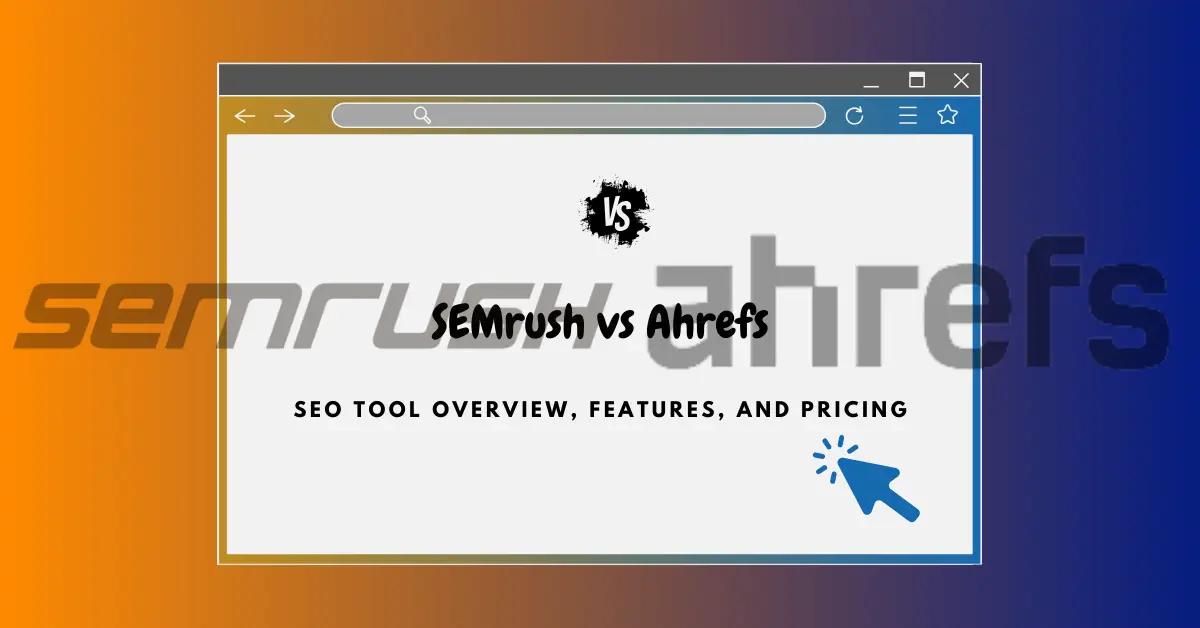SEO is tough enough, so choosing the right tool can make all the difference. SEMrush and Ahrefs are both packed with features, but they excel in different areas. Depending on whether you’re focused on SEO, content marketing, or a broader strategy, each platform offers unique strengths. Let’s break it down feature by feature, with a clear look at where each shines and where they might fall short and see which stands ahead in SEMrush vs Ahrefs showdown.
Table of Contents
Keyword Research: Who Owns the Data?
Ahrefs is known for its vast keyword database, and its Keywords Explorer tool is a favorite for analyzing search volumes, keyword difficulty, and competitive traffic potential. You’ll quickly identify which keywords could bring in the most traffic based on search intent and value.
On the flip side, SEMrush’s Keyword Magic Tool also does a solid job, but it adds an extra layer by suggesting long-tail variations and related phrases to expand your keyword list. Plus, it incorporates paid and organic search data, which makes it highly versatile.
Advantages:
- Ahrefs: Larger keyword database, better for those laser-focused on SEO traffic.
- SEMrush: A more holistic keyword tool combining organic, paid, and competitor data into one view.
Disadvantages:
- Ahrefs: Lacks deep PPC integration.
- SEMrush: Slightly less depth in organic keyword suggestions compared to Ahrefs’ more straightforward approach.
Backlink Analysis: Size vs. Usability
When it comes to backlink data, Ahrefs is known for its massive backlink index, which is often praised for being updated faster and more frequently. You can analyze a site’s backlink profile to the finest detail, including domain authority, referring domains, and anchor text, giving you deep insights.
SEMrush, on the other hand, takes backlink analysis and runs with it by offering integrated link-building outreach features. SEMrush will suggest relevant sites for outreach, and you can send emails to prospects directly from the platform. It’s a time-saver for those looking to act fast on backlink data.
Advantages:
- Ahrefs: Best for deep backlink analysis with real-time updates.
- SEMrush: Backlink analysis coupled with outreach tools for actionable results.
Disadvantages:
- Ahrefs: Purely analytical with no built-in outreach capabilities.
- SEMrush: The backlink index is large but still catching up to Ahrefs in scope.
Site Audits: Keeping Your Website Healthy
Both tools are extremely helpful when it comes to site audits, but their approaches differ slightly. Ahrefs runs detailed audits, scanning over 100 SEO issues like broken links, duplicate content, and slow loading times. It’s thorough and well-presented, offering actionable insights in a simple interface.
SEMrush, however, takes things further by prioritizing recommendations based on traffic potential. If your site audit reveals numerous issues, SEMrush helps you sort out what will have the biggest impact on your rankings first.
Advantages:
- Ahrefs: Clean, straightforward audits that focus on a wide range of SEO problems.
- SEMrush: Prioritized recommendations based on real-world traffic gains so you know what to tackle first.
Disadvantages:
- Ahrefs: Lacks prioritization; all issues are treated equally.
- SEMrush: Sometimes offers overwhelming amounts of data for beginners.
Rank Tracking: Monitoring Your Success
Both tools offer rank tracking but with slight differences. Ahrefs’s rank tracker is straightforward, with daily updates and movement trends for your targeted keywords. It’s effective and reliable but doesn’t offer much in terms of comparative features.
SEMrush goes a bit deeper with rank tracking. You can monitor positions across multiple locations, devices (desktop vs. mobile), and even competitor rankings. Plus, SEMrush lets you track visibility scores and offers SERP feature tracking so you can see where you’re showing up in featured snippets, local packs, and other SERP real estate.
Advantages:
- Ahrefs: Simple, reliable rank tracking with fast updates.
- SEMrush: Offers deeper insights with location, device tracking, and competitor comparison.
Disadvantages:
- Ahrefs: Doesn’t offer SERP feature tracking or competitor ranking overlays.
- SEMrush: It may overcomplicate things for users who need basic rank tracking.
Content Exploration and Optimization
Ahrefs’s Content Explorer is a unique tool that lets you discover high-performing content in your niche. It’s perfect for finding inspiration or uncovering what’s trending in your industry. You can filter by shares, backlinks, or traffic, allowing you to find content that’s getting attention. However, it’s mostly geared toward discovery rather than optimizing existing content.
SEMrush offers more of a hands-on approach with its Content Analyzer. You get insights into the performance of your existing content, along with optimization tips for readability, SEO, and even social sharing. SEMrush goes beyond discovery to help you improve what’s already on your site.
Advantages:
- Ahrefs: Best for content discovery and competitor research.
- SEMrush: Superior for content optimization and improving existing articles.
Disadvantages:
- Ahrefs: Limited in optimizing your existing content.
- SEMrush: Content discovery tools aren’t as extensive as Ahrefs.
PPC Capabilities: SEMrush Takes the Lead
SEMrush clearly outshines Ahrefs when it comes to PPC (pay-per-click) campaigns. SEMrush has a built-in suite of tools for analyzing competitors’ paid search strategies, researching keywords, and even tracking the performance of your paid campaigns. Ahrefs, however, doesn’t venture into the PPC realm.
Advantages:
- SEMrush: Full PPC campaign tools for those managing paid search strategies.
- Ahrefs: None in this category.
Disadvantages:
- Ahrefs: No PPC capabilities.
- SEMrush: This can be overwhelming if you’re only focusing on organic SEO.
User Interface: Ease of Use Matters
Both platforms offer clean, intuitive interfaces, but they do differ slightly. Ahrefs is known for its clean, no-frills design that prioritizes functionality over style. Everything’s laid out simply, making it easier to quickly jump into specific tools and find what you need.
SEMrush offers a more visually engaging experience, with colorful dashboards, plenty of charts, and a bit more flair in how data is presented. However, the added visual elements can sometimes make it feel cluttered.
Advantages:
- Ahrefs: Simple, functional design for easy use.
- SEMrush: Engaging, visually rich dashboards for more detailed analysis.
Disadvantages:
- Ahrefs: A bit too plain for users who prefer visually engaging tools.
- SEMrush: It can be visually overwhelming if you prefer simplicity.
Pros and Cons Summary
Ahrefs:
Pros:
- Exceptional for backlink analysis.
- Huge keyword database.
- Great for content discovery.
Cons:
- Lacks PPC capabilities.
- Not as user-friendly for beginners.
SEMrush:
Pros:
- A holistic tool that covers SEO, PPC, content, and social media.
- Great for content optimization.
- Excellent rank tracking and local SEO tools.
Cons:
- The Backlink database is smaller than Ahrefs.
- The interface can be overwhelming for newcomers.
Final Verdict
Both SEMrush and Ahrefs are powerful tools, but they excel in different areas. Ahrefs is a powerhouse for backlink tracking, keyword research, and competitor content discovery. SEMrush, on the other hand, is ideal for users who need a broader marketing tool with a focus on not just SEO but also PPC, social media, and content optimization.
The choice comes down to what’s more important for you: Do you need a specialized SEO tool with deep backlinks and keyword data? Or do you need an all-in-one solution that covers SEO and beyond?

